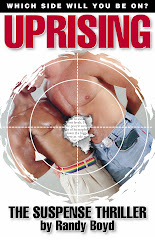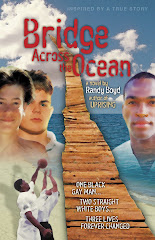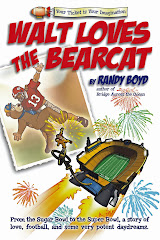 In November 1991, Magic Johnson shocked the world when he announced his HIV status in a press conference that became one of those "where were you?" moments in television history.
In November 1991, Magic Johnson shocked the world when he announced his HIV status in a press conference that became one of those "where were you?" moments in television history.Where was I? Glued to the TV like most people that day. Only unlike most people watching, I, too, was like Magic, with the "HIV virus living inside my body," as the legendary LA Laker put it.
Below is a reprint of my reaction to that moment in time, an essay that ran in Frontiers magazine in December 1991, followed by a 2008 perspective.
Just Like Magic
My brother, homeboy to the core, dope dealer, father of (at least) three out-of-wedlock babies to three different flygirls, asks me on the phone: “So you got the same thing Magic’s got?”
He and the world have known about Magic Johnson for a hot second, as my mother would put it. He’s known about me for several months; this is the first time my brother has mentioned AIDS since he learned I was positive.
He’s known about me for several months; this is the first time my brother has mentioned AIDS since he learned I was positive.
Taking up the old roles of our destructive sibling rivalry, we get into a shouting rage on the phone: He proclaims that Magic and I are receiving our own separate punishments for our own separate unpardonable crimes against the Bible (while it’s perfectly permissible for him to sell dope and have unwedded—and unsafe—sex as long as he asks for the Lord’s forgiveness every night). Then he’s shocked to learn that sometimes there’s a part of my exhausted soul that wants to die because I’m sick and tired of living in a world that hates blacks, gays and people with AIDS.
Earlier in the day, the big burly men with blue blazers and baritone voices on ESPN’s SportsCenter went on and on about AIDS activists' hailing Magic’s courage, the medical prognosis for victims, the debate over testing. Where were the sports scores, the highlights, the slam dunks, the high fives?
Strangers in a strange land, they seemed to me, Magic and the legions of reporters, using words I live and breathe every day, words I’ve lived and breathed for seemingly a lifetime now. It was perverse yet vindicating, flabbergasting yet fleeting. I mean, here was the world, finally dealing with what I’ve had to deal with every second of every hour of every day.
Magic’s claiming straight, and while I’m not saying he’s lying, it’s entirely possible we’re still experiencing some denial, as un-American as it is to let this thought pass through my lips. As longtime Lakers announcer Chick Hearn warned with the glassy-eyed sternness of a bullish heavyweight: “Of all the ways he could have gotten it, don’t think the wrong way.” Right way? Wrong way?
longtime Lakers announcer Chick Hearn warned with the glassy-eyed sternness of a bullish heavyweight: “Of all the ways he could have gotten it, don’t think the wrong way.” Right way? Wrong way?
 the same thing Magic must now fight for: life.
the same thing Magic must now fight for: life.
The score is now AIDS 1, Gays 0. Yes, this may prove good for research, awareness, drug protocol, testing, etc., but as a gay man, I haven’t gained a thing. As a gay man with HIV, I can only pray that some of the drugs and compassion trickle down to me. To the doubters: let’s see if Magic Johnson stands side by side with a gay man on the HIV continuum and acknowledges and accepts that man’s sexuality without the slightest hint of judgment. Remember—and they’ll constantly remind us—he didn’t get it the wrong way; its was some dirty woman’s fault, just like Eve.
Yet I know how horrible and terrifying it is to find out this bomb is ticking inside; and I’ve seen the helpless look in the eyes of friends and loved ones. It’s no picnic for anyone, Magic and the world that worships him included. And because of this, I’m trying my best to lessen the molten rock of anger within me and leave room for compassion for another human being living with the virus, regardless of his sexuality.
to lessen the molten rock of anger within me and leave room for compassion for another human being living with the virus, regardless of his sexuality.
But still I wonder. If Magic’s not as far from homosexual as he claims, by lying he’s doing nothing for himself as a lover of men, nothing for me as a gay man, nothing for all the confused young boys out there terrified of their sexuality.
If it is true without question that he’s “never had a homosexual experience. Never,” as he says in Sports Illustrated, then the molten rock melts a little more to know there is no cover-up going on. But for me, the doubt may always linger, perhaps because I want so much for a person of Magic Johnson’s stature to be able to fight the world on both fronts, homophobia and AIDS.
want so much for a person of Magic Johnson’s stature to be able to fight the world on both fronts, homophobia and AIDS.
And perhaps unintentionally, he’s already doing that. CBS Sports analyst Pat O’Brien said on ESPN: “We all owe the gay and lesbian community an apology that it took something like this for us to pay attention to the disease.” If I were a frightened young boy our there watching, that would have brought me a little further out of the closet.
But I just wish I knew the whole truth about Magic. And why he’s so adamant about trumpeting his heterosexuality. And why there seem to be discrepancies in his testing story and medical history. And what would all the people canonizing him really think if he were completely like me? Questions. Questions. Questions.
Magic Johnson may have joined the war, and now we might be in for more supplies, but make no mistake: He is as yet only an ally, not a hero. The hero part remains to be seen.
2008 Epilogue: It's amazing to think that I'm alive today, having survived long enough to be able to post on a “blog” on the “internet” what I once wrote on a primitive word processor long before the world was dreaming of blogs and long-term survivors of AIDS. Magic Johnson’s high-profile, long-term survival has benefited humanity’s struggle with AIDS, and indeed, my own personal journey.
before the world was dreaming of blogs and long-term survivors of AIDS. Magic Johnson’s high-profile, long-term survival has benefited humanity’s struggle with AIDS, and indeed, my own personal journey.
Magic Johnson helped the world deal with AIDS. Magic Johnson helped make AIDS the kind of priority that leads to life-sustaining drugs. He did this by living openly and thriving with HIV/AIDS, and for this, I am grateful. In the long run, upon further reveal, this AIDS soldier did receive some of the trickle down, and continues to live openly, thriving with HIV/AIDS.
And though the world has a long way to go towards full acceptance of people with AIDS, and though the sports world has an even longer way to go towards full acceptance of people regardless of sexual orientation, the fact that I’m still alive gives me hope on all fronts. Anything truly is possible. Magic and miracles happen.
He and the world have known about Magic Johnson for a hot second, as my mother would put it.
 He’s known about me for several months; this is the first time my brother has mentioned AIDS since he learned I was positive.
He’s known about me for several months; this is the first time my brother has mentioned AIDS since he learned I was positive.Taking up the old roles of our destructive sibling rivalry, we get into a shouting rage on the phone: He proclaims that Magic and I are receiving our own separate punishments for our own separate unpardonable crimes against the Bible (while it’s perfectly permissible for him to sell dope and have unwedded—and unsafe—sex as long as he asks for the Lord’s forgiveness every night). Then he’s shocked to learn that sometimes there’s a part of my exhausted soul that wants to die because I’m sick and tired of living in a world that hates blacks, gays and people with AIDS.
"I can only pray that some of the drugs and compassion trickle down to me."
Later that night, on Arsenio, Magic makes it clear that he is “far from homosexual” and gets an approving round of applause from the woofers packing the audience. Then he goes on to talk  about HIV this and HIV that and the virus blah blah blah and how he’s going to become a spokesman for HIV. (Did anybody ask HIV if it wanted a spokesman?)
about HIV this and HIV that and the virus blah blah blah and how he’s going to become a spokesman for HIV. (Did anybody ask HIV if it wanted a spokesman?)
 about HIV this and HIV that and the virus blah blah blah and how he’s going to become a spokesman for HIV. (Did anybody ask HIV if it wanted a spokesman?)
about HIV this and HIV that and the virus blah blah blah and how he’s going to become a spokesman for HIV. (Did anybody ask HIV if it wanted a spokesman?)Earlier in the day, the big burly men with blue blazers and baritone voices on ESPN’s SportsCenter went on and on about AIDS activists' hailing Magic’s courage, the medical prognosis for victims, the debate over testing. Where were the sports scores, the highlights, the slam dunks, the high fives?
Strangers in a strange land, they seemed to me, Magic and the legions of reporters, using words I live and breathe every day, words I’ve lived and breathed for seemingly a lifetime now. It was perverse yet vindicating, flabbergasting yet fleeting. I mean, here was the world, finally dealing with what I’ve had to deal with every second of every hour of every day.
Magic’s claiming straight, and while I’m not saying he’s lying, it’s entirely possible we’re still experiencing some denial, as un-American as it is to let this thought pass through my lips. As
 longtime Lakers announcer Chick Hearn warned with the glassy-eyed sternness of a bullish heavyweight: “Of all the ways he could have gotten it, don’t think the wrong way.” Right way? Wrong way?
longtime Lakers announcer Chick Hearn warned with the glassy-eyed sternness of a bullish heavyweight: “Of all the ways he could have gotten it, don’t think the wrong way.” Right way? Wrong way?They’re all strangers talking. And they still don’t care about me. To the world, Magic Johnson is one of the innocent victims, like the babies. From Rome, George Bush called him a hero. From Kennebunkport weeks earlier, he dismissed the outcries of AIDS activists who were fighting for" I just wish I knew the whole truth."
 the same thing Magic must now fight for: life.
the same thing Magic must now fight for: life.The score is now AIDS 1, Gays 0. Yes, this may prove good for research, awareness, drug protocol, testing, etc., but as a gay man, I haven’t gained a thing. As a gay man with HIV, I can only pray that some of the drugs and compassion trickle down to me. To the doubters: let’s see if Magic Johnson stands side by side with a gay man on the HIV continuum and acknowledges and accepts that man’s sexuality without the slightest hint of judgment. Remember—and they’ll constantly remind us—he didn’t get it the wrong way; its was some dirty woman’s fault, just like Eve.
Yet I know how horrible and terrifying it is to find out this bomb is ticking inside; and I’ve seen the helpless look in the eyes of friends and loved ones. It’s no picnic for anyone, Magic and the world that worships him included. And because of this, I’m trying my best
 to lessen the molten rock of anger within me and leave room for compassion for another human being living with the virus, regardless of his sexuality.
to lessen the molten rock of anger within me and leave room for compassion for another human being living with the virus, regardless of his sexuality.But still I wonder. If Magic’s not as far from homosexual as he claims, by lying he’s doing nothing for himself as a lover of men, nothing for me as a gay man, nothing for all the confused young boys out there terrified of their sexuality.
If it is true without question that he’s “never had a homosexual experience. Never,” as he says in Sports Illustrated, then the molten rock melts a little more to know there is no cover-up going on. But for me, the doubt may always linger, perhaps because I
 want so much for a person of Magic Johnson’s stature to be able to fight the world on both fronts, homophobia and AIDS.
want so much for a person of Magic Johnson’s stature to be able to fight the world on both fronts, homophobia and AIDS.And perhaps unintentionally, he’s already doing that. CBS Sports analyst Pat O’Brien said on ESPN: “We all owe the gay and lesbian community an apology that it took something like this for us to pay attention to the disease.” If I were a frightened young boy our there watching, that would have brought me a little further out of the closet.
But I just wish I knew the whole truth about Magic. And why he’s so adamant about trumpeting his heterosexuality. And why there seem to be discrepancies in his testing story and medical history. And what would all the people canonizing him really think if he were completely like me? Questions. Questions. Questions.
Magic Johnson may have joined the war, and now we might be in for more supplies, but make no mistake: He is as yet only an ally, not a hero. The hero part remains to be seen.
2008 Epilogue: It's amazing to think that I'm alive today, having survived long enough to be able to post on a “blog” on the “internet” what I once wrote on a primitive word processor long
 before the world was dreaming of blogs and long-term survivors of AIDS. Magic Johnson’s high-profile, long-term survival has benefited humanity’s struggle with AIDS, and indeed, my own personal journey.
before the world was dreaming of blogs and long-term survivors of AIDS. Magic Johnson’s high-profile, long-term survival has benefited humanity’s struggle with AIDS, and indeed, my own personal journey.Magic Johnson helped the world deal with AIDS. Magic Johnson helped make AIDS the kind of priority that leads to life-sustaining drugs. He did this by living openly and thriving with HIV/AIDS, and for this, I am grateful. In the long run, upon further reveal, this AIDS soldier did receive some of the trickle down, and continues to live openly, thriving with HIV/AIDS.
And though the world has a long way to go towards full acceptance of people with AIDS, and though the sports world has an even longer way to go towards full acceptance of people regardless of sexual orientation, the fact that I’m still alive gives me hope on all fronts. Anything truly is possible. Magic and miracles happen.
- Randy Boyd is an author who has been living with HIV/AIDS since 1985. His novels feature main characters who are black and HIV positive, and have been nominated for a total for five Lambda Literary Awards.




















